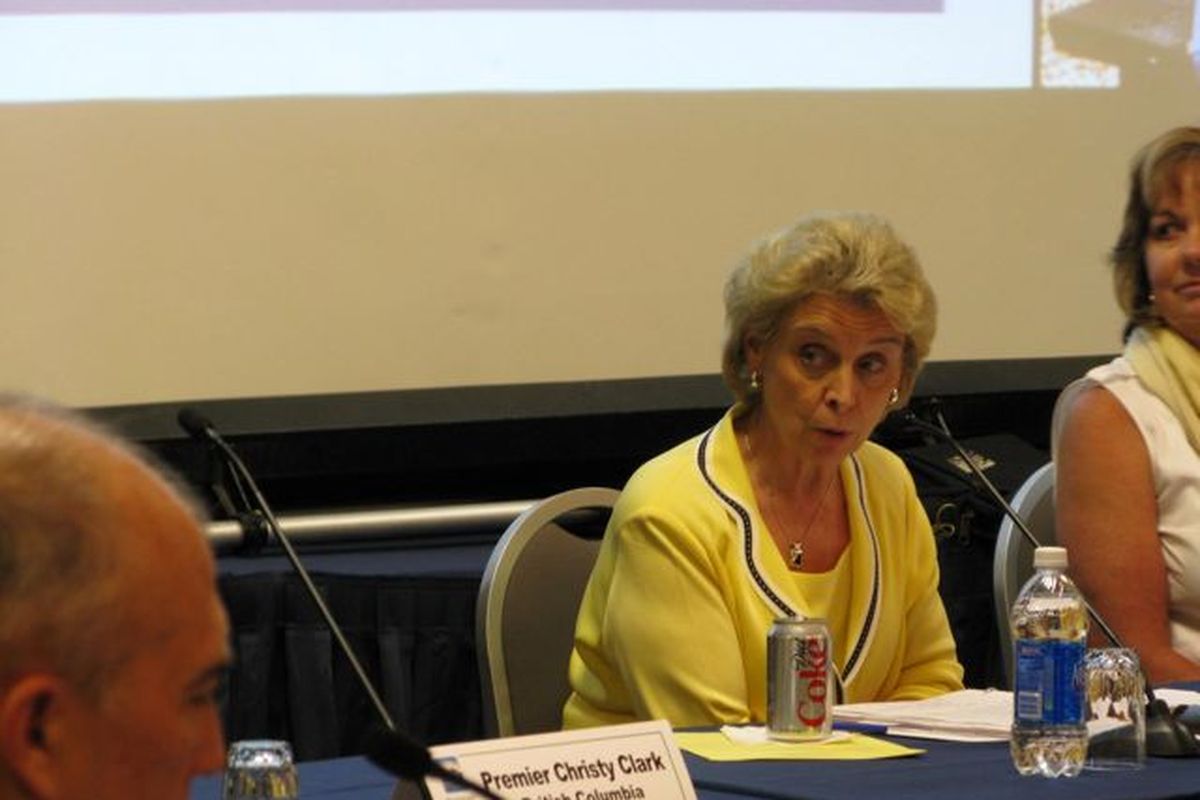Western governors: States must help returning vets

COEUR d’ALENE - Western governors are interested in following Washington Gov. Chris Gregoire’s lead to closely track National Guard members after they return from deployment to Iraq or Afghanistan, for everything from health to employment needs.
Utah Gov. Gary Herbert said, “I want to go back and make sure that’s what we’re doing, and if we’re not doing it, make sure we’re doing it. … Because I really do believe that the key issue here is first make sure the veterans know. … It doesn’t matter how good the program is if they are not aware of it.”
It was just one of an array of solutions western governors discussed for how to help the many veterans returning from Iraq and Afghanistan in a dismal job market, as they convened the annual conference of the Western Governors Association on Wednesday in Coeur d’Alene.
“We always tell these soldiers as they’re shipping out that it’s our job to take care of their families while they’re being deployed, it’s their job to get over there and get the mission accomplished,” said Idaho Gov. Butch Otter, the association’s current chairman. More than 2,800 individuals from western states were deployed to Iraq last fall in a single deployment and likely will be returning home this fall, Otter said. “We need to be prepared as well as we can.”
The governors heard from top military officials and others that legal constraints currently keep the military from providing post-service training to members while they’re serving, and keep states from even knowing where disabled returned veterans are so they can reach out to them with help, due to privacy laws.
Legislation is pending in Congress to lift some of those constraints against training, and Gregoire said, “I hope we can all step up and offer some help in that regard. … We can unite as governors and tell Congress we want a solution.”
She said the program to track returning National Guard members for at least a year has been “unbelievably successful in our state. But again we have all the information, so it’s not a problem for us. … Our state and every department really wants to be there and catch these people and be of help to them.”
Montana Gov. Brian Schweitzer was taken aback to hear that the military is now foreclosed from providing post-service job training. “Wow, that isn’t what they told ‘em when they recruited ‘em,” he said. “They say, ‘We’re going to train you for the rest of your life, that we’re going to get you a skill.”
David Brasuell, Idaho veterans services administrator, said in Idaho, the state Department of Transportation got a grant to work with the state Department of Labor to help returning vets with experience driving heavy equipment get their commercial drivers licenses. “It’s already helped 18 veterans,” he said, 12 of whom have recently gotten commercial trucking jobs. The agencies are seeking a bigger grant next year to take the program statewide.
Gregoire said Washington is working to ease occupational licensing rules so they better match up with the occupational training returning veterans receive while serving.
Gregoire said she pledged to visit her state’s national guardsmen who were deployed to Iraq, and when she did so, she was shocked to hear that their concerns, at base after base, focused on whether they’d be able to support their families when they returned home.
“We’ve worked very hard in Washington state, to take the training they had, get it recognized by the state and get them into really good, family-wage jobs,” she said. “The goal here is for us as governors and those of you who’ve joined us today to walk out of here with some really actionable ideas that we can take home and implement.”
Former U.S. Secretary of Veterans Affairs Jim Nicholson told the group that more than 27 percent of returning veterans age 18-24 “do not have a job today - that’s more than one out of four. So I think we can stipulate that this is a problem.”
Education programs, including the “new G.I. Bill,” are good, Nicholson said. “The problem is not that, the problem is jobs. Twenty-seven percent of these young returning guys and gals are unable to find a job.”
The reason is more than just the current downturn, he said, though that exacerbates the situation. “We’ve discovered that are many reasons. Among them is a lack of confidence on their part, because they left high school, many of them, did a four-year enlistment, so they haven’t had any experience in that civilian sector. … They have difficulty articulating their military experience in a way that articulates to a human resources person interviewing them.”
Marine Corps Brigadier General Robert F. Hedelund said, “This is a very, very important subject,” and said the military is now involved in the first major revamp to its transitional assistance program for veterans in 19 years.
“I think everybody in this room can acknowledge that a lot has happened in our country in 19 years, so it’s time to start looking at this,” he said.
Nicholson said, “I’m so glad you governors are on top of it.” Employment of returning veterans when the nation relies on an all-volunteer military force, he said, is “so strategically important to our country.”
The governors of Idaho, Washington, Montana, Utah, Wyoming, and Arizona participated in the conference Wednesday; the governor of Oregon is en route, and the governor of Colorado will join the group Thursday. Also attending the annual meeting of the 19-state group are state and federal agency officials; Canadian officials including Canadian Ambassador Gary Doer; lobbyists; industry people; lawmakers and more.